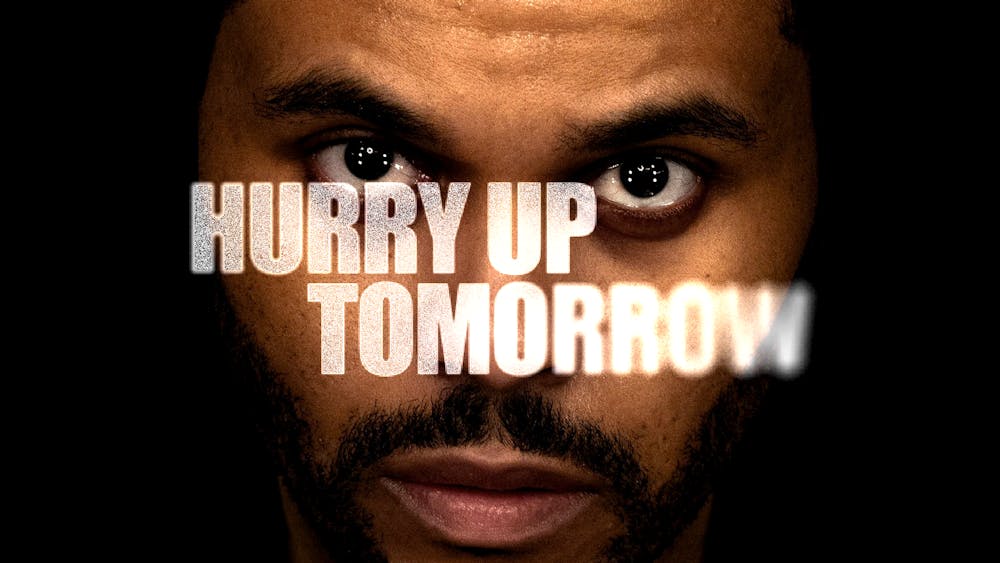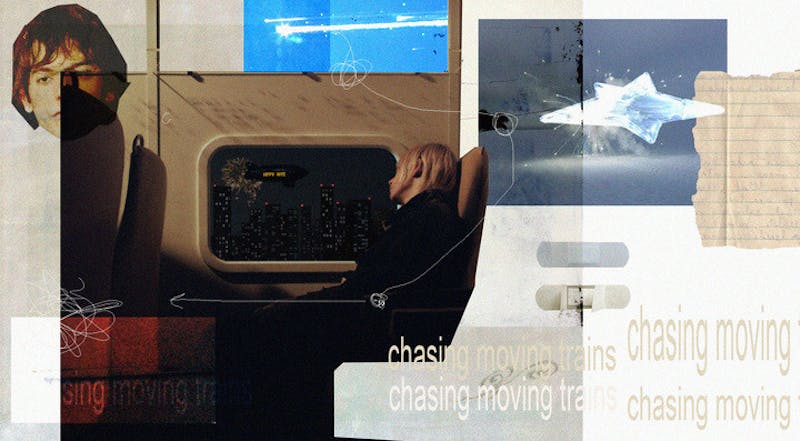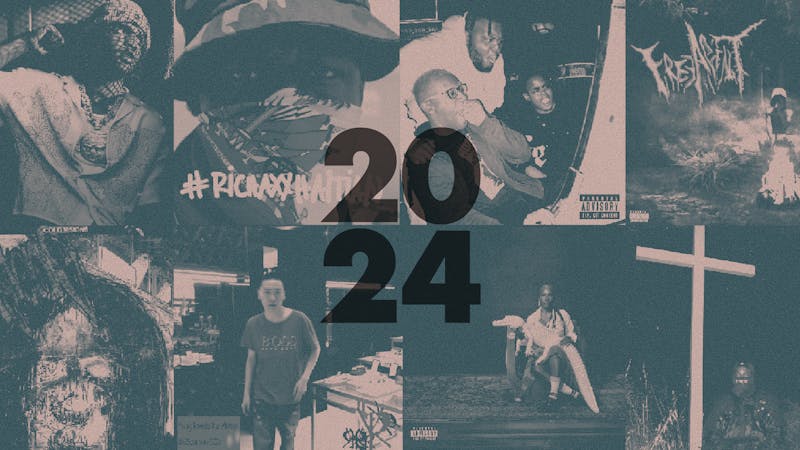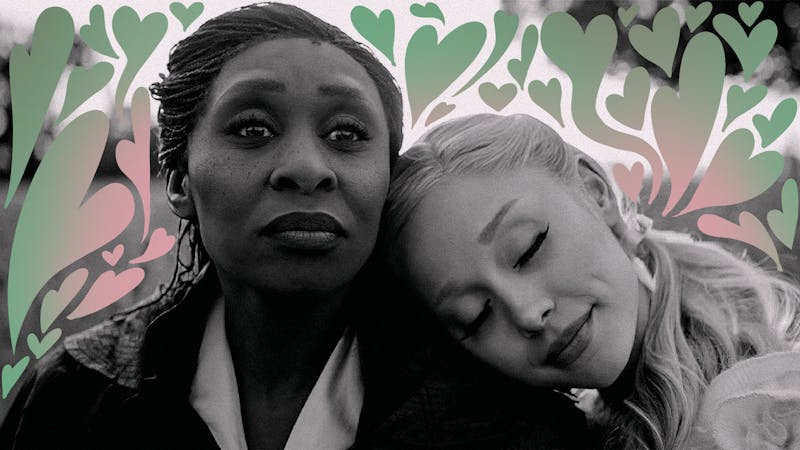Abel Tesfaye has spent the last five years making highly thematic albums, revealing to us the inner workings of his hedonistic, dark The Weeknd persona. His last two projects—After Hours and Dawn FM—contained highly visual, conceptual imagery, and leaned into this focus, featuring cinema–inspired narratives that slowly depicted The Weeknd's inevitable descent into madness. Regarding After Hours, The Weeknd’s costume designer Patrick Henry, more popularly known as “Fresh,” told Billboard, “When he did this, it wasn’t just Abel anymore. He created a persona and took this guy through a whole experience.” Dawn FM picked up where After Hours left off—inserting The Weeknd into a state of purgatory, followed by a journey towards escape. Hurry Up Tomorrow is the light at the end of this tunnel, offering the same immersive experience. Announcing this album as his last as The Weeknd, Tesfaye lets this infamous persona take his last breaths in Hurry Up Tomorrow. But one question remains: Just how great of a finale is this?
The album opens up with the track “Wake Me Up (feat. Justice).” In the beginning, a gothic, dark instrumental plays while The Weeknd acknowledges his impending doom. “No afterlife, no other side / I’m all alone when it fades to black,” he sings seemingly in acceptance that The Weeknd persona will be no more after this. The instrumental picks up into a Michael Jackson–style synth as he calls out to someone or something to save him before it’s too late: “It's coming to the wire … / Open up my eyes.” “Cry for Me,” which follows, has a similar production. The Weeknd regrets not being transparent with a girl as he feels his time coming to an end. This lament over his romantic missteps echoes those expressed in other songs in The Weeknd’s discography like “Out of Time” and in the album at large. He alludes to how lonely he has become: “In this penthouse prison, I'm alone.” The song then fades into a 12–second clip entitled “I Can’t F**king Sing,” a callback to a time during his 2022 tour when he lost his voice mid–song at SoFi Stadium. The first three tracks do a great job at establishing the “doomsday” narrative of Hurry Up Tomorrow and effectively set up the grave for The Weeknd persona while also keeping some of his usual essence, still reminiscing on his romantic anguish and the dark shadow wealth and fame have cast over his life.
The second single off of the album, “São Paulo (feat. Anitta),” is the album’s most sonically interesting track. The Weeknd tries his hand at Brazilian Funk while singing explicitly and boastfully about an enigmatic woman who he describes as: “Hot like risin' sun, burnin' everything she touch / She don't even want your money, can buy you and someone else.” And while Anitta’s opener—sung entirely in Portuguese—sets up a hard hitting, hypnotizing beat, her talent was underutilized in the rest of the track.
Lead single “Timeless (feat. Playboi Carti)” is also a notable collaboration and also one of the stronger tracks of the album. Playboi Carti and The Weeknd get together to brag about their undisputed relevance with the catchy opening hook, “Ever since I was a jit knew I was the shit” repeated throughout the song. Unlike Anitta, Carti contributed to a significant portion of the song. However, his performance pales in comparison to The Weeknd’s stellar vocal performance. Overall, the singles on their own were very strong and clearly made to get The Weeknd back on the chart, but as far as the story goes, they weren’t major contributors.
Other collaborations on this album include “Reflections Laughing (feat. Travis Scott, Florence + The Machine),” “Enjoy The Show (feat. Future),” and “The Abyss (feat. Lana Del Rey).” “Reflections Laughing” is a beautifully produced track, initially set up by the interlude that is “Opening Night,” seamlessly blending into the simple, gospel–like instrumental of the song’s beginning. Here, The Weeknd expresses his desire to be vulnerable, singing, “Don't you let me down / If you let me drown / I'll die in your arms again.” This testimony continues until an obtrusive phone ring, the caller expressing their concern for The Weeknd’s mental state: “I'm just worried, you worked so hard to be better … Don't let this industry break you …” While the track tells an interesting story with stellar production, the scarcity of Florence Welch’s vocals are underwhelming.
“Enjoy The Show” carries the same emotional motif as “Cry For Me.” The lyrics describe an intense desire to remain close to a lover as the world ends. The Weeknd also describes his struggles with drug abuse (“Take another hit, or my music, they won't feel it”) and coming to terms with his death (“And I'm ready, I'll go overdose / I don't wanna make it past 34”). But the track didn’t really stand out, blending into the background echoing the same repetitive story already presented by “Cry For Me.” “The Abyss” is apocalyptic, and Lana Del Rey’s stunning vocals mesh well with The Weeknd’s—unsurprising, since they are frequent collaborators.
A recurring theme in the Hurry Up Tomorrow universe is a reference to a higher power. In “Given Up On Me,” The Weeknd questions why the entity or the world hasn’t just given up on him yet despite his sins. He ends by calling out, “Oh, Lord, my company / Mercy me.” He does this again in tracks like “Give Me Mercy” and “Big Sleep (feat. Giorgio Moroder).” The Weeknd’s desire for spiritual absolution ties in well with the album’s theme, but he does truly beat it to death. It would’ve been nice for him to approach this spiritual motif a little differently in each track.
In the final tracks, The Weeknd reminisces on things in a more positive light—a rare quality in his usual music. He chooses to cut back on his usual hedonism and let some light in. In “Red Terror,” he sings from his mother’s perspective, honoring her sacrifices and, in a way, apologizing to her. The Weeknd’s reminiscing on childhood culminates with the line “call me by the old, familiar name,” alluding most likely to his birth name Abel Tesfaye, which he intends to create music under once this album cycle is over. The thematic range throughout the album is commendable, and it’s refreshing to see The Weeknd embrace some unconventional subjects in this album.
After spending the entire album announcing his imminent death, The Weeknd finally leaves us on the last track, which shares the namesake of the album. In “Hurry Up Tomorrow,” The Weeknd completely surrenders: “Now I'm ready for the end / So burn me with your light / I have no more fights left to win,” he sings. He affirms that he is ready to be a different man: “I'm done with the lies, I'm done with the loss / I hope this confession is enough.” The Weeknd exits with the line “I want heaven when I die / I wanna change / I want the pain no more … ” accompanied by a heavenly instrumental. The track is lyrically complex and beautiful, and the production supports this perfectly.
Overall, Hurry Up Tomorrow is a decent effort from The Weeknd that brings us in as he experiences his final moments. While it is part of an interesting narrative, it lacks the same edge and coherence of his last two records. The Weeknd’s usual strengths are ever–present: cutting–edge genre bending production and stunning vocal delivery. It was also refreshing to see themes that The Weeknd usually doesn’t touch on such as motherhood, rebirth, and spirituality.
However, Hurry Up Tomorrow is comparatively the least interesting of the trilogy—it lacks the gusto and excitement of After Hours, as well as the innovation in Dawn FM. Several songs sounded more like variations of other tracks than their own, separate advances in a larger narrative, which interrupted the flow of the story. Some of the collaborations were also underwhelming.
The album’s themes of doomsday and death were ever–present but lacked a lot of coherence. It felt less like a story and more like a vague series of emotional tangents—some good but scattered songs about The Weeknd’s imminent death warning, mixed with a variety of tracks that hail from his usual work. But Tesfaye might have done better by his audience by picking up in the purgatory Dawn FM left off and leading us smoothly and progressively into the end. Assessed apart from the trilogy, Tesfaye did good by The Weeknd’s memory, with some excellent songs on the album to boot. If this is truly the end of The Weeknd as we know it, it's not a bad way to go out. I sincerely hope that he sees the pearly gates, just as he hoped.






